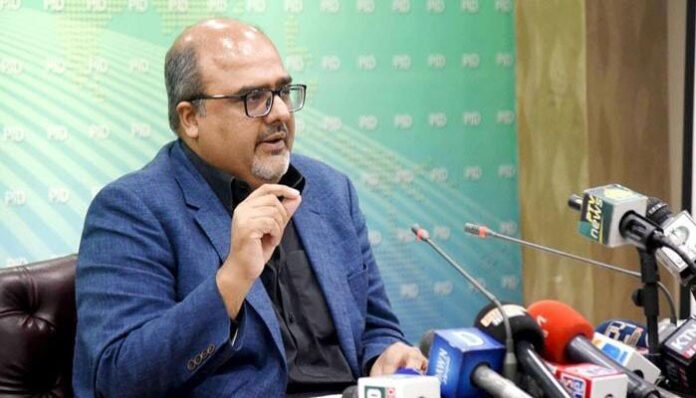Adviser to Prime Minister on Accountability and Interior Barrister Mirza Shahzad Akbar on Thursday served a defamation notice seeking Rs500 million in damage to Pakistan Muslim League-Nawaz (PML-N) leader Uzma Bukhari for “pass(ing) defamatory statements and rais(ing) false and absurd imputations” against him in a television show.
The remarks in question are when Uzma, during a late-night show titled Faisla Ap Ka on Aaj TV, accused the adviser of having taken a 50 per cent kickback commission from Broadsheet LLC. Akbar termed these remarks “completely untrue and libelous defamatory statements”.
The legal notice was sent through his counsel and said that Uzma must tender an official apology or pay damages.
Akbar tweeted that the amount received in damages would be distributed among charity organisations after being received from Uzma.
In the notice served to Uzma, Akbar insisted he had been a “target of hateful media campaigns from members of the PML-N and other opposition parties” in an attempt to stop him from playing a “pro-active role he is playing in curbing corruption and ensuring accountability”.
The notice said that Moussavi had “stated at many occasions that [Akbar] is a man of integrity”.
A day earlier, Akbar had served a legal notice to PML-N spokesperson Marriyum Aurangzeb over a statement targeting him.
The SAPM had announced this in a tweet which had said that, on his instructions, his lawyers had served a legal notice to Marriyum for her defamatory statement against him.
Like Uzma, Marriyum had alleged during a press conference that Akbar tried to solicit 50 per cent commission in a payment of $25 million to Broadsheet LLC.
She has tried to sabotage the anti-corruption campaign in the country by leveling false accusations against me that I tried to seek a 50 per cent commission from Broadsheet company, the notice read, adding that the company’s CEO has repeatedly asserted Akbar is an honest man.
Regarding the allegations of taking commissions, Broadsheet CEO Kaveh Moussavi spoke to to a local news outlet on the various aspects of his issues with the National Accountability Bureau (NAB) and during the dialogue, the CEO had confirmed that Akbar was not part of the meeting where the visiting Pakistani official asked him for bribe.
Moussavi stated that he had met the the adviser to the PM on two occasions. At the Royal Gardens Hotel and the Chelsea Arts Club, wherein they discussed ending the litigation.
Moussavi said that Akbar was not present when a Pakistani official met him at the Café Rouge and demanded bribes for getting the deal signed with the Pakistan Tehreek-e-Insaf (PTI) government.
Akbar has said he met Kaveh Moussavi in 2019 to “negotiate the award price and trying to reduce the payable amount”. He insisted that he had not met with the Broadsheet CEO in 2018.
It was claimed that an unnamed individual who accompanied Akbar to a meeting with Moussavi was “more interested in getting his cut than investigating suspects”.
A day earlier, Akbar while addressing a press conference at Shahrah-e-Quaid-e-Azam, had said political elite were busy in protecting themselves and their looted money, adding that Nawaz Sharif and Maryam Nawaz should bring the Broadsheet case before the people as the PML-N leadership’s corruption had been exposed after this case.
He had said that the PML-N and Pakistan People’s Party (PPP) had taken benefits from the NRO wherein they had made the first deal with former president Pervaiz Musharraf, adding that another deal was made in Hudaibya Papaer Mills case.
He had said that the PPP and PML-N had no political ideology but the PTI government had an agenda to completely eliminate the corruption from the society.
Broadsheet LLC is a UK-based company registered in the Isle of Man during the Pervez Musharraf era and had helped the then government and newly established NAB track down foreign assets purchased by Pakistanis through alleged ill-gotten wealth.




